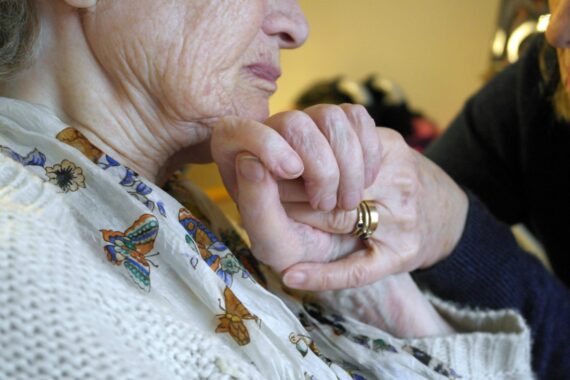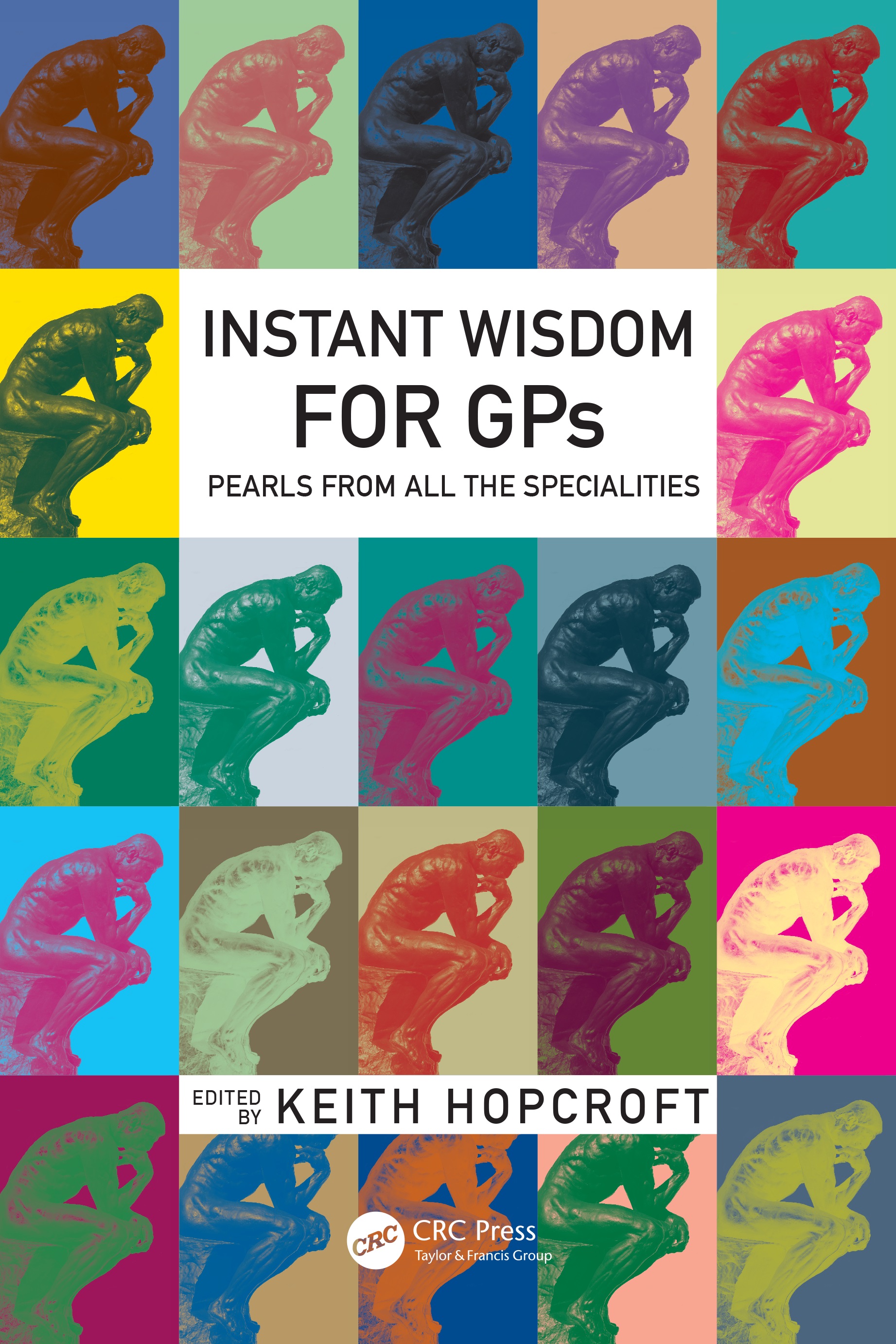Instant wisdom – managing older patients

Five pearls
1. The absence of typical UTI symptoms in older patients means it probably isn’t a UTI
…and isolated confusion is not a typical symptom, so it requires a full evaluation for other causes before a diagnosis of UTI can be made. Typical symptoms include new dysuria, frequency, urgency, suprapubic tenderness, polyuria or haematuria. Bear in mind, too, that the prevalence of asymptomatic bacteriuria – the presence of bacteria in the urinary tract of a patient without typical symptoms of a UTI – increases with age, institutionalisation and the presence of permanent catheters. Asymptomatic bacteriuria is more common than UTIs in older patients and results in the overdiagnosis of UTIs in this age group.
2. Delirium may well point to underlying dementia and so needs follow up
Delirium is an acute state of confusion which fluctuates, results in an altered consciousness level and reduces levels of attention (see also the ‘Easily Confused’ section). In up to 20% of patients, no cause is found, but it is not normal for older patients to become delirious. It should be considered a marker of lowered neurological reserve and is a good predictor for who will go on to develop dementia. One study has suggested that up to 60% of patients presenting to hospital with delirium but no known dementia diagnosis had dementia at 3-month follow up.
3. Care home life expectancy is lower than most people think
While some individuals live for many years in care homes, the average life expectancy of residents is much lower than you might imagine. People in residential care can expect to live on average for two years, while for those who need nursing care, survival drops to only one year. This has important implications, as current palliative care thinking is that we should be asking ourselves, when considering advance care planning, the following question: ‘Is this patient at risk of dying within the next year?’ Advanced care planning is time consuming and challenging, but is vital in providing a comfortable and dignified end of life.
4. Clarify what patients mean when they complain of feeling dizzy
This is a problem seen in ENT clinics, too. It is vital you identify exactly what the patient means. Broadly speaking, there are three categories:
- Vertigo: A true sensation of spinning or significant movement. This is normally caused by problems in the vestibular system.
- Light-headedness or syncope: Feeling faint with the sensation they might black out. The cause is normally cardiovascular in origin.
- Unsteadiness: A complex symptom of feeling of imbalance. Normally, this relates to a combination of problems of muscle strength, vestibular function, gait and posture.
5. 24-hour tapes are rarely useful in falls assessments
24-hour ECG recordings for falls are often inappropriately requested in primary and secondary care. In patients with a normal resting ECG, the pick-up rate for significant cardiac arrhythmias is only one or two per 100 24-hour tapes. In practice, unless there are red flag symptoms of syncope without warning, palpitations or chest pain, the cause is unlikely to be cardio-arrhythmic if the resting ECG is normal. A careful history, cardiac examination and a proper lying and standing BP are much more likely to reveal the cause of the fall.
Obscure or overlooked diagnoses
1. Postprandial hypotension
This occurs in up to one third of older patients. It is defined as a drop in systolic blood pressure greater than 20 mmHg when standing up following a meal. Lightheadedness, falls and syncope can occur up to two hours after eating. The reduction in blood pressure is a result of blood pooling in the abdomen to promote effective digestion of the meal. Certain conditions increase the risk of PPH in later life – including Parkinson’s disease, diabetes and persistent hypertension. Treatment involves small regular meals and avoiding exacerbating factors. Antihypertensives should be reviewed.
2. Carotid sinus syndrome
This is a rare but significant cause of pre-syncope, syncope and falls in older people. Patients complain of symptoms when the carotid baroreceptors are stimulated by movements such as turning the head, neck extension or wearing tight fitting collars. It causes either a few seconds of asystole (requiring a pacemaker), or an episode of hypotension (treatment focusing on advice, hydration and reducing risk factors for low blood pressure). It is often misdiagnosed as ‘vertebrobasilar insufficiency’.
3. Normal pressure hydrocephalus (nPH)
This is caused by the abnormal build-up of cerebrospinal fluid within the cerebral ventricles. It results in a triad of cognitive impairment, urinary incontinence and gait abnormalities. The gait is slow, broad based and shuffling with the appearance of the feet sticking to the floor. Although it can progress more quickly than many dementia syndromes, it is potentially reversible with treatment. If the history is consistent with these symptoms a CT head and neurology refer should be considered. The patient with NPH may benefit from a VP shunt.
Easily confused
1. Parkinson’s disease, Depression and Alzheimer’s dementia
| Parkinson’s | Depression | Alzheimer’s | |
|---|---|---|---|
|
Cognitive decline |
Late onset Over one year after motor symptoms |
None in mild depression Pseudodementia – presents as subacute decline that fluctuates with mood |
Prominent Progressive over years |
|
Depressive symptoms |
Common late on |
Prominent in early stages |
Common in later years |
|
Hallucinations |
Not common |
Not common |
Not common |
|
Parkinsonism |
Prominent |
Rare |
Rare |
|
Gait |
Classic Parkinson’s gait |
Not affected unless very severe |
Apraxic gait |
|
Falls |
Often not a feature at diagnosis but occur during disease progression |
Not common |
Occur later in the disease
|
|
Tremor |
Common |
Not present |
Rare |
2. Delirium and dementia
| Delirium | Dementia | |
|---|---|---|
|
Onset |
Acute (days) |
Slow (months) |
|
Course |
Fluctuating |
Gradual deterioration |
|
Awareness |
Hyperactive = increased agitated Hypoactive = decreased, passive |
Normal until later stages |
|
Attention |
Reduced |
Normal until later stages |
|
Memory |
Poor working memory and recall |
Poor short term memory |
|
Delusions |
Short-lived and changeable |
Fixed |
|
Hallucinations |
Transient visual hallucinations |
Mixed hallucination in later stages |
3. PMR and osteoarthritis
| PMR | Osteoarthritis | |
|---|---|---|
|
Pain onset |
Develops over days |
Gradual over years |
|
Pain characteristics |
Ache and stiffness worse in the morning and often relieved by movement |
Pain worse on movement with minimal morning pain or stiffness
|
|
Joint involvement |
Generalised proximal muscles and joints (shoulder and thigh) |
Normally affects a few large joints (knee, hip and spine) |
|
Inflammatory markers |
CRP and ESR raised |
Normal |
|
Examination findings |
Often normal |
Joint deformity or pain common |
|
Response to steroids |
Rapid improvement in days |
No significant effect |
Prescribing points
1. Antipsychotics in dementia
Antipsychotic medications have historically been overprescribed, despite their risks in older patients. Haloperidol or risperidone should only be prescribed for short courses in extreme cases and need to be reviewed regularly. This is because patients on antipsychotics have higher mortality than similar patients whose behaviour is managed non-pharmacologically. The higher death rates are secondary to an increased risk of stroke and TIAs.
2. Incontinence medications and dementia
Incontinence is common in patients with dementia. There are various reasons for this, including failure to recognise the need to void, failure to get to the toilet in time, communication problems and difficulty with undressing to use the toilet. Incontinence in patients with dementia is rarely solely secondary to detrusor instability, so the classic anticholinergic medications are unlikely to help. These treatments are associated with confusion and an increase in the rate of cognitive decline, and therefore should be avoided in patients with dementia.
3. ACE inhibitors and diuretics in acute illness – sick day rules
ACE inhibitors and diuretics are commonly prescribed in older patients. Both can exacerbate kidney injury and electrolyte imbalance in acute illness. Stopping such medications in patients with gastrointestinal symptoms similarly is vital; any condition that causes drowsiness and reduced oral intake should prompt cessation of these medications until 48 hours after the patient has recovered.
Dr James Woodard is a consultant geriatrician at Derby Teaching Hospitals NHS Foundation Trust
This is an abridged version of a chapter in Instant Wisdom, a guide for GPs distilling years of knowledge, experience, and key evidence into 25 easy-to-read chapters, each one covering a different speciality. Pulse is offering an exclusive 15% discount to GPs on the recommended retail price. To take advantage of this offer, visit www.crcpress.com/9781138196209 and enter PUL15 at the checkout.

Pulse July survey
Take our July 2025 survey to potentially win £1.000 worth of tokens











